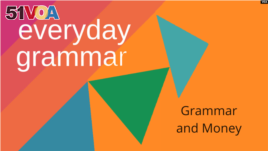23 February 2023
Imagine that you want to talk about money or personal finance. What kinds of terms and structures should you use?
In today's Everyday Grammar, we will explore how discussions about money connect with grammar. You will learn about important terms, common sentence patterns, and more.
Let's start with some important terms and ideas.

Everyday Grammar
Definitions
When we discuss money, we often use a small group of nouns. Such nouns include "money," "income," "savings," "investments," "deposits," or "withdrawals."
But equally important to these money-related nouns are money-related verbs. These verbs include "spend," "save," "invest," "make," "deposit," and "withdraw."
Note that there are many similarities between the nouns and the verbs.
We use these individual nouns and verbs to express ideas or actions about money.
But how exactly do English speakers express such ideas?
Sentence pattern
One of the clearest and most common ways that English speakers discuss money is by using the transitive verb pattern.
The basic structure is this:
Subject + transitive verb + direct object (noun or noun phrase)
For example:
I saved money.
The subject is "I," the verb is "saved," and the direct object is "money."
Now consider this sentence:
I saved $50.
The sentence structure is the same: Subject + transitive verb + direct object.
In this case, the direct object is specific: $50.
Now consider a more complex discussion.
Hi, John, what are you doing?
I'm making a deposit.
In this example, we have the verb "make" along with the direct object, a deposit.
The opposite of a deposit is a withdrawal: to take money out of a bank account. We also say that you "make a withdrawal," as in:
Hi, John, what are you doing?
I'm making a withdrawal.
If you want to give exact numbers, you could also use the verb forms of deposit and withdraw as follows:
I deposited $30.
I withdrew $30.
Now imagine a very wealthy person describes how much money they make in year. They might say:
I make $1 million a year.
Now imagine a person who describes money that they lost.
They might say:
I lost $1 million last year.
In all of these examples, we have used the same basic sentence pattern. The transitive verb pattern. Some additional information may be given, for example, the words "last year," but the same basic idea runs through all the sentences.
In this way, you can think of the transitive verb pattern as the frame, or basic structure of a house. You might paint the surface or outside of a house a different color, but the basic structure under the paint remains the same.
So, too, can you make colorful word choices to express different ideas. The underlying sentence pattern, much like the frame of our house, remains the same.
Practice
Now let's take some time to work with these ideas.
Use the noun $5 and the verb "invest" to talk about an action related to money.
Pause the audio to consider your answer.
Here is one answer:
I invested $5.
Now use the verb "make" along with the noun phrase "a bad investment."
Pause the audio to consider your answer.
Here is one answer:
I made a bad investment.
Now use the pronoun "he" along with the verb "save" and the noun phrase "a lot of money."
Pause the audio to consider your answer.
Here are two possible answers:
He is saving a lot of money.
He saved a lot of money.
Closing thoughts
In today's report, we explored how English speakers use one sentence pattern to talk about money. They use this pattern to talk about many other subjects too!
You should remember that English speakers also use other sentence patterns to talk about money. But what you learned today was the most common and useful way to talk about money in everyday situations.
I'm John Russell.
John Russell wrote this lesson for VOA Learning English.
_
Words in This Story
deposit – n. an amount of money that is put in a bank account
transitive verb – n. a verb that takes a direct object
pattern – n. the regular and repeated way in which something happens or is done











